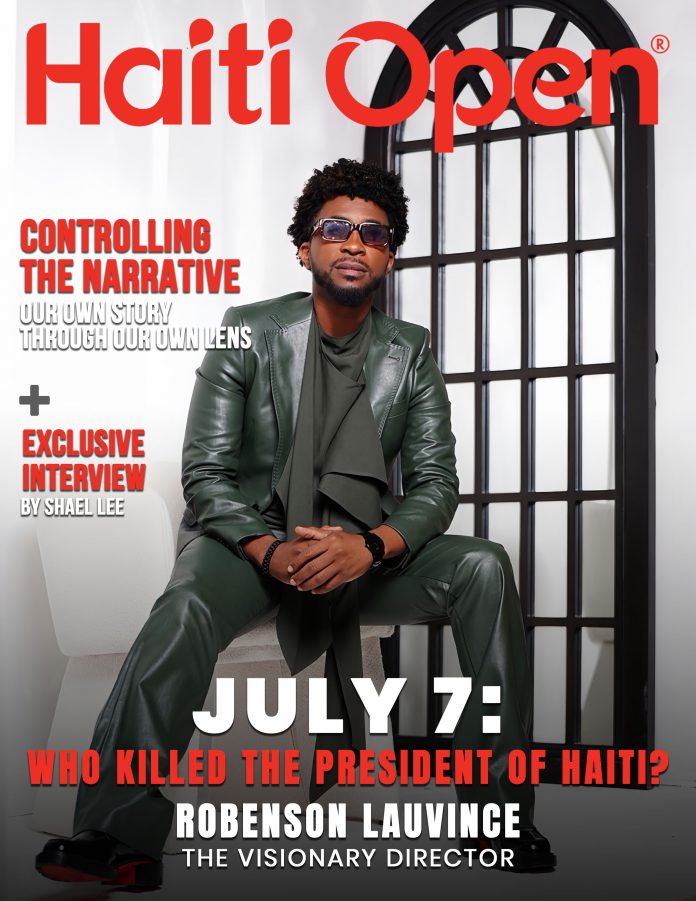Director Robenson Lauvince’s Bold Cinematic Journey into Haiti’s Tumultuous History
By Shael Lee
The world was rocked by the assassination of Haitian President Jovenel Moise on July 7, 2021, which plunged the nation into turmoil and left a legacy of unanswered questions. In his latest film, July 7: Who Killed the President of Haiti?, acclaimed Haitian filmmaker Robenson Lauvince takes audiences on a gripping journey through one of the most pivotal moments in the country’s modern history. More than just a political thriller, this cinematic endeavor is a testament to the resilience, struggles, and aspirations of the Haitian people as they navigate an intricate political and social landscape.
For Lauvince, telling this story is about more than just recounting an event; it is about giving voice to a nation that has long fought for stability, justice, and a brighter future. July 7: Who Killed the President of Haiti? seeks to provide an in-depth exploration of Moïse’s leadership, the socio-political climate that shaped his presidency, and the far-reaching consequences of his assassination.
Bringing such a sensitive and intricate story to life required meticulous research and an unwavering commitment to accuracy. Lauvince and his team consulted historians, journalists, and members of the Haitian community to ensure the film remained as authentic as possible. While based on real events, certain elements have been fictionalized to enhance the narrative’s emotional depth, allowing audiences to connect more profoundly with the story. The film skillfully weaves together firsthand accounts, political analysis, and historical records to create an immersive and thought-provoking experience. Lauvince’s dedication to detail ensures that July 7: Who Killed the President of Haiti? is not just a film but a piece of history told from a Haitian perspective.
One of the greatest challenges in crafting July 7 was striking a balance between emotional depth and factual accuracy. Given the deeply personal nature of the story for many Haitians, Lauvince felt a tremendous responsibility to handle every aspect of the film with care. The complexities of Haiti’s political landscape, marked by corruption, inequality, and foreign influence, demanded a nuanced approach. Lauvince’s goal is not to provide easy answers but rather to ignite critical conversations about Haiti’s past, present, and future. The Haitian community played a crucial role in shaping the film’s authenticity. Many of the cast and crew members are of Haitian descent, infusing the production with personal connections and lived experiences that enrich the storytelling.
“This film is meaningful because it is the first time a Haitian gets to tell the story of their people through the lens of a Haitian. No one can tell our story better than us,” Lauvince passionately states.
July 7: Who Killed the President of Haiti? It is not just a film; it is a movement. Lauvince hopes that audiences will walk away with a deeper understanding of Haiti’s rich culture and resilience, as well as the systemic challenges it faces. He envisions a Haiti where stability, economic growth, and social justice are not just aspirations but realities. Moreover, he underscores the importance of unity within the broader Caribbean community and beyond. Elevating Haitian voices and advocating for policies that respect the nation’s sovereignty are crucial steps toward a more just and equitable future.
Lauvince invites audiences to experience July 7: Who Killed the President of Haiti? at its highly anticipated premiere on March 1, 2025, at 6:30 PM at the Olympia Theater, 174 E Flagler St, Miami, FL 33131. With its powerful storytelling, meticulous research, and deep reverence for the Haitian people, the film aims to shed light on a pivotal moment in history while paving the way for a deeper understanding of Haiti’s struggle for justice and sovereignty. As Lauvince aptly puts it, telling this story is not just about looking back; it’s about shaping a more informed and compassionate future. Through July 7: Who Killed the President of Haiti?, he invites the world to witness the resilience of Haiti and to stand in solidarity with a nation that refuses to be defined by its struggles, but rather by its enduring strength and hope.
#JULY7THEREALITYOFMYNATION
Photographer: JROOS
Stylist: Maritza Boudoir
Creative Director: Wesbie Lauvince



